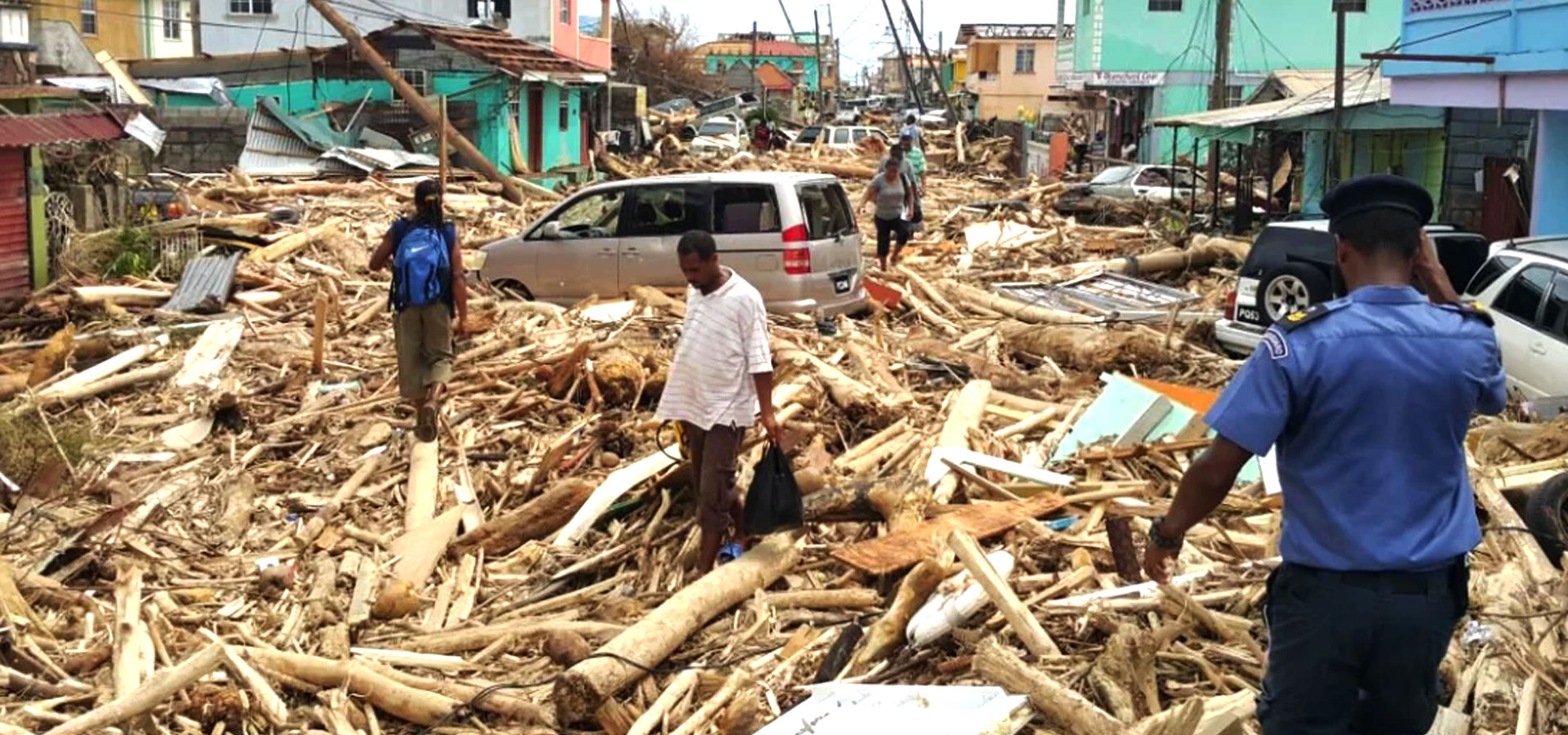
Individual
customers

1What Are The Origins Of The DNDDF?
The Dominica Natural Disaster Fund (DNDF) was set up in 1990 in the wake of Hurricanes Gilbert (1988) and Hugo (1989) and renamed the Dominica National Development & Disaster Fund (DNDDF) in 2012. This historic event was the culmination of a series of meetings held from 8th October 1989 at the High Commission in Earls Court London involving the three main London based Dominican Associations, namely the Dominica UK Association (DUKA) in the East, Dominica Overseas Nationals Association (DONA) in the West and Dominica Development Association (DDA) in the North of the capital.
2Why Was The DNDDF Set Up?
In the unfortunate event of natural disasters such as hurricanes, floods, landslides, etc., it is important that every effort is made to provide emergency assistance in a planned and co-ordinated manner. Due to Dominica’s history involving such disasters it was considered necessary for the Dominican Associations and the High Commission to pool their energies and resources to ensure that urgent action can be taken to provide assistance whenever the need arose.
3What Are The Main Objects?
The original main Objects were concerned with:
• To relieve persons in Dominica/Commonwealth of Dominica, West Indies and elsewhere who are in conditions of need, hardship or distress as a result of local natural disasters.
• To relieve persons in the United Kingdom and elsewhere who have suffered in a similar way.
Over the years it became clear that there was a need to retain the main clauses dealing with natural disasters, but also address the priorities of national development and other socio-economic issues that are relevant to Dominica and its communities. Accordingly the following additional Objects have been introduced:
• The management of developmental self-help programmes and projects initiated by individuals or groups in the Commonwealth of Dominica, the United Kingdom and elsewhere.
• To establish and manage a Development Fund distinct from the Disaster Relief Fund for the purpose of facilitating the development of special community welfare and self-help projects in the Commonwealth of Dominica, the United Kingdom and elsewhere.
• To develop and facilitate better linkage, networking and collaboration among and with organisations in Dominica, the United Kingdom and elsewhere.
• To develop strategies and action plans for meeting the needs gap of the youth through education, thereby instilling a sense of citizenship and cultural identity by encouraging their full participation in projects involving disaster preparedness and socio-economic development benefiting their communities in Dominica, the United Kingdom and elsewhere.
• To develop strategies and action plans for meeting the socio-economic needs of senior citizens in Dominica, the United Kingdom and elsewhere.
• To act as a forum for discussion, consultation and the development of strategies and action plans for disaster preparedness and relief, and meeting the socio-economic needs of communities primarily in Dominica and the United Kingdom.
• To act as an umbrella group for the purpose of co-ordinating and developing strategies and action plans, accumulating resources and expertise and targeting their deployment for assisting the social and economic development of communities in Dominica and the United Kingdom.
4What Is The Significance Of The DNDDF Logo And Registration Number?
The DNDDF logo depicts the helping hands of our people dispersed throughout the continents. The focus is on Dominica and the need for preparation to mitigate against the adverse effects of Natural Disasters that too often devastate our “Nature Island” and other similar states. The DNDDF motto is therefore “Ready to Assist“, in recognising the need for the Dominican Diaspora to participate in a strategy for Disaster Preparedness and socio-economic development of Dominica. In 1492 Christopher Columbus arrived in the Caribbean and coincidentally and significantly, the registration number issued to the DNDDF by the Charity Commissioners for England and Wales is 1001492.
5Is There A Written Constitution?
In 1990 formulation of the Governing Instrument or constitution and agreement between the founding member Associations was completed and signed by three representatives of the member Associations: Mr Vincent M John; Mrs Mervin Caesar-John and Randolph Victor (d) representing DUKA; Ethelca Brand, Alphonso Charles (d) and Ivor Davis (d) for DONA; and for DDA Mr Gerry Williams, Mr George St. Paul and Ms Stella Delsol. The witness to the signatories on 10th November 1990 was the late Honourable Dame Mary Eugenia Charles, the then Prime Minister of the Commonwealth of Dominica during her visit to England. The GI was reviewed and changes made on 19th May 2016 to give the DNDDF greater clarity, democracy and facilitate more effectiveness in its operations.
6When Was The DNDDF Established And What Were The Drivers?
The Associations’ representatives tasked with compiling the Governing Instrument were Mr Alphonso Charles (d), Mr Randolph Victor (d), and Mr. Vincent M John). Further reviews were undertaken in 1992 and 1994, when the Management Board sought to expand the scope and objects of the DNDDF in order to address the high priority assigned to economic development in the work of the voluntary organisations.
7What Changes Are Proposed To Be Made?
Further reviews of the Governing Instrument commenced in 2003, firstly with the encouragement of the High Commissioner, His Excellency Mr George Williams and then the Acting High Commissioner, Mr Brian Bellevue, both aiming to expand the scope of the DNDDF to include a wide range of socio-economic development objects and to provide an “umbrella” forum for all Dominican organisation to liaise and formulate initiatives for meeting the needs of communities in the UK and in Dominica in a spirit of partnership and shared vision. Between 2006 and 2010 the Governing Instrument was comprehensively reviewed in consultation with the Charity Commission covering the following areas: • widening of the Main Objects • increase the Powers • expansion of the provisions for membership • changes to voting rights to include small groups • facility for co-option of individuals • arrangements for Associate Membership • provision for setting annual subscriptions • clarification of the election of office bearers • specific financial reporting arrangements • facility for collaborative activities • provision for the apportionment of net proceeds • the establishment of separate disaster and development fund accounts to facilitate the achievement of both key over-riding objects of the DNDDF • amendment to quorums • clarifications of clauses At the AGM in May 2016 further amendments were made including: • Introduction of one-organisation-one vote • Clarification of the nature of the DNDDF as an organisation whose members are registered charities who have a right to vote and voluntary community groups who are eligible to participate in all aspects of the DNDDF through their up to three authorised representatives but do not have a vote • Clarification of the role of Ex Officio members The Charity Commission has been consulted and their feedback included in the reviewed Governing Instrument. The Management Board approved the reviews to the Constitution which has been endorsed by the Charity Commission. elementum orci phasellus ipsum tincidunt eu.
8What Is The Current DNDDF Membership?
Efforts made by the Management Board to increase the membership base included correspondence, representations and presentations to Dominican Associations in London and as far afield as Preston, Lancashire and Bradford in Yorkshire, etc. All Dominican organisations are eligible to join the DNDDF, irrespective of size and registered charity status. Currently Members of the DNDDF are: The Dominica UK Association (DUKA) Dominica Overseas Nationals Association (DONA) Dominica Secondary Schools Supporters Association (DASSSA) Waitikubuli Cultural & Tourism Initiative Slough Dominican Association Sineku Trust Dominica Youth UK The High Commission for The Commonwealth of Dominica in the United Kingdom of Great Britain and Northern Ireland is an ex officio member of the DNDDF.
Business
customers

1How Is The DNDDF Managed?
The DNDDF Management Board is responsible for ensuring that the Charity pursues its agreed objects and complies with the laws and codes governing charities in the United Kingdom and European Union. Each Full Member organisation is entitled to nominate representatives on the Management Board. There is also an arrangement for co-option of individuals with specific skills that can be deployed to assist the DNDDF.
The principal office bearers are the Chairman, Honorary Secretary and Honorary Treasurer, and the Management Board has the power to establish other posts and employ persons to perform functions supporting the objects.
2What Are The Voting Arrangements?
Each Full Member organisation can nominate up to three (3) permanent delegates as representatives to The Dominica Diaspora Fund on the Management Board. Full member organisations are eligible to cast one vote although they may have up to three authorized representatives. Associate members who are not registered charities cannot vote.
3How Does The DNDDF Raise Funds?
The main source of funds for the DNDDF has been the organising of the Independence Anniversary Celebration events in the UK, including a Show & Dance, Kweyol Supper, Exhibition and Commemorative Services.
It is with this in mind that Members and supporters are reminded of the need to maintain their support for these events in order to ensure the continued work of the DNDDF. In 2007 the DNDDF participated as partners in DUKA’s Mas Domnik UK Carnival Jam and Band On-De-Road at Notting Hill.
A Donation and Gift Aid Appeal programme has been compiled with a view to launching following the formal change of name and Constitution by the Charity Commission.
The Dominica Diaspora Fund will be considering additional fundraising strategies after the revised Constitution has been approved by the Charity Commission.
4What Are The Current Targeted Priority Projects?
The Dominica Diaspora Fund Management Board has undertaken an assessment of the needs of the local communities and selected the following priority areas due to their high level of vulnerability and risk with a view to assisting, subject to resource availability:
1) Disaster Preparedness and Forward Relief Programme in conjunction with the Dominica Disaster Preparedness Office.
2) Homes for the Elderly in conjunction with the Infirmary in Dominica.
3) Facilities for Disabled Persons in conjunction with the Association for Disabled Persons in Dominica and other appropriate partners and agencies.
4) Hospital and Health Centres in conjunction with the Dominica-China Friendship (Princess Margaret) and Portsmouth Hospitals, Health Centres in Dominica and relevant agencies.
5) A Dominica Culture Centre in the United Kingdom, preferably London.
6) Children Safeguarding, e.g. “Chances” place of safety and accommodation in Jimmit, Dominica.
These priorities are reviewed annually and may change depending on resources needs assessments and feedback from targeted potential beneficiaries.
5How Can I Assist?
The Dominica Diaspora Fund’s motto is “Ready To Assist“. Dominican associations and groups, through their membership can play a key role in assisting the DNDDF to assist Dominica and its communities in the UK and in Dominica in addition to being prepared to assist in the event of a natural disaster on our “Nature Island”. Organisations can assist the DNDDF in numerous ways, including:
• Securing membership of the DNDDF whilst concurrently pursuing their differentiated objects and areas of interest.
• Participating in the development of its Disaster Preparedness Policy and Strategy Action Plan.
•Developing Policies and Strategies for the inclusion and retention of Dominican Youth and addressing their needs and aspirations.
•Developing Policies and Strategies for addressing the needs of senior citizens.
• Converting policies into achievable and robust Action Plans for each area of DNDDF activity, for instance through the establishment of task-and-finish interest groups.
•Fund-raising to create a viable resource base to implement, sustain and achieve the DNDDF’s objectives.
Individuals can assist by:
•joining their local or preferred Dominican charity or voluntary community group to
•individuals with special skills may be selected by the Management Board as members of the Disaster Preparedness Teams or working groups.
• Individuals with special complementary skills may be considered by the Management Board for co-option.
• Making donations and Gift Aid to the DNDDF
• Volunteering at events and activities organised by the DNDDF.
